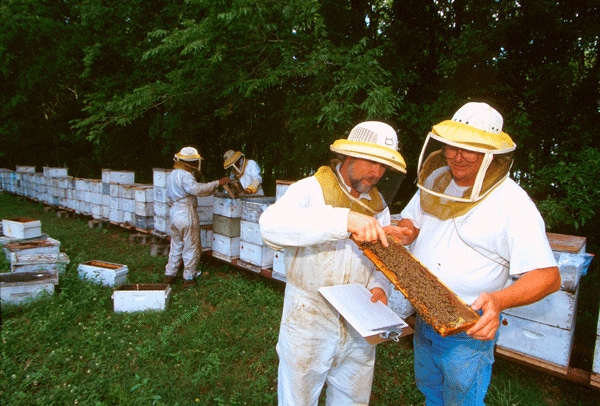May 10, 2011

One of Virginia’s most valuable agricultural assets, the honeybee, continues to struggle to survive.
Disease problems, an unknown syndrome called colony collapse disorder and cold weather hit the state’s bee population hard again last winter.
"This past year we’re probably seeing higher losses than the year before," said Keith Tignor, state apiarist with the Virginia Department of Agriculture and Consumer Services. "We’re still surveying, and it will be a few months before we know exact results. But informally we’re hearing of lots of bee losses."
Winter honeybee losses have averaged 31 percent over the past decade, according to statistics reported by Tignor to the Virginia Farm Bureau Emerging Agricultural Enterprises Committee.
Honeybees are extremely valuable, because they are all-purpose pollinators, helping boost production of numerous agricultural crops. Tignor estimated honeybees increased the market value of all Virginia farm commodities by almost $110 million in 2007.
A rapid decline in commercial honeybee operations has made it more difficult to maintain a viable honeybee population in Virginia, Tignor said. In 1950 the state had 83,149 bee colonies, but in 2010 that number had declined to 5,000. A honeybee colony can have several hives. He estimated there are only 2,000 to 3,000 beekeepers in Virginia, with between 24,000 and 36,000 hives. Only about 200 of them are commercially active in helping farmers pollinate.
VDACS and Virginia Cooperative Extension are working to change that through education and encouraging more Virginians to raise and keep bees. Extension has been developing a Master Beekeeper program to help train beekeepers, and the number of local beekeeping associations has doubled in the past decade, from 18 groups in 2000 to 36 in 2010.
"We’re also encouraging beekeepers to look for local queen supplies and for local bees to start new colonies with," Tignor said, explaining that most new queen bees are purchased from Georgia and other Southern states. "That will help us get bees that are acclimated to our climate, our winters and summers, our rainfall and droughts. That will also hopefully increase the genetic diversity of the bees and help them survive some of the problems we’ve had in the past."
You May Also Like




